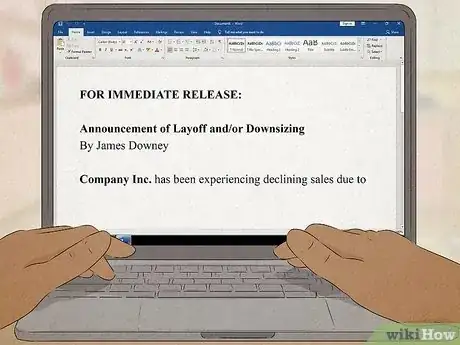This article was co-authored by Amber Rosenberg, PCC. Amber Rosenberg is a Professional Life Coach, Career Coach, and Executive Coach based in the San Francisco Bay Area. As the owner of Pacific Life Coach, she has 20+ years of coaching experience and a background in corporations, tech companies, and nonprofits. Amber trained with the Coaches Training Institute and is a member of the International Coaching Federation (ICF).
There are 9 references cited in this article, which can be found at the bottom of the page.
This article has been viewed 107,159 times.
Layoffs are a reality of the business world. The process is usually unpleasant for both parties involved, but there are ways to make the experience less painful. Layoffs often come in large batches; if a company is not doing well it will lay off a percentage of its workforce. Understanding how to perform an effective layoff that is both legal and compassionate is important.
Steps
Planning the Layoffs
-
1Think about who you need to lay off. Make sure that the people that remain will be able to cover the work of those who are being laid off. Layoffs, unlike firings, are typically about the company performing poorly and needing to let part of the workforce go. With layoffs, employees will be able to claim unemployment benefits. Firings, on the other hand, are usually about the poor performance of the employee.[1] How exactly will the downsizing work? Will people be changing offices, or are you moving to a smaller space? Think very carefully about layoffs before you serve the termination letter because you don’t want to regret losing key people.[2]
-
2Meet with your lawyer. You need to know the best way to go about laying people off. You should know your rights and responsibilities as an employer.[3] You will also need to know your employees’ rights and responsibilities, and how they can go about collecting unemployment benefits.[4]
- Talk with your Human Resources department as well, if you have one. This way, you can make sure that you're following any protocols set by your organization.[5]
Advertisement -
3Communicate with your staff. If you’re going to be laying off people, chances are it’s because your business is not doing well. Discuss the health of your business with your staff before doing layoffs. They might have good ideas about how to turn it around or find some creative solutions to the problems you are facing. It might turn out that you don’t need to lay off people (or at least not so many as you thought). If you do end up doing layoffs, at least your staff will be aware that this is part of a larger problem and not due to their performance.[6]
- ”I’m sorry to have to tell you all this, but our business has been dropping for the last two quarters. I am considering layoffs, even though I really don’t want to do it. We just don’t have the money to pay everyone going forward.”
- ”We’re looking at bankruptcy if we don’t make some changes in the staff. I don’t want to lay anyone off, but I think it’s going to be necessary.”
- ”The recession has made our client list almost dry up. If you have any suggestions, I’d love to hear them. But if we don’t make some changes, I’m going to have to lay people off.”
-
4Plan the timing of the announcement. Some business experts suggest Tuesday morning. It’s early enough in the week (but not Monday) that you’ll be able to control the response in the office. People can talk about it and think about it during work, rather than getting upset alone about it over the weekend. Avoid Fridays at the end of work and first thing Monday morning -- both are times when it will make people feel more resentful. Also steer clear of announcements right before holiday weekends for layoffs.[7]
Being Compassionate
-
1Practice what you will say to the employee beforehand. Try to think of ways to explain the situation compassionately. Imagine possible responses to being laid off and strive to find good answers or replies to different reactions. Be honest and respectful. Think about preparing a script to follow and memorizing the key points you want to make.
-
2Perform the layoff as soon as possible. Once you know it’s unavoidable, plan the time and place for your meetings with employees. It’s better for everyone to get it over quickly.[10]
-
3Make an appointment and do the layoff in person. Even though it’s going to be uncomfortable, you have to tell each employee to their face that they are being laid off. This way you can have a conversation, listen to each other, and try to find ways that you can help the employee move forward.
- ”Jan, I am so sorry, but I’m going to have to let you go. You’ve been a great employee, but we’re going to be closing the department you work in because of budget problems.”
- ”No one wants to hear this, but we’re going to have to lay you off. We can only operate with a skeleton staff going forward, and this means that we are going to eliminate your position.”
- ”This is really hard, but I’m going to have to let you go. You’ve worked so hard for us, and I’ve seen how much you’ve grown. I know that wherever you find your next job is going to be so lucky.”
-
4Be ready for strong emotions. You need to be empathetic in dealing with your employees, who will almost certainly be very upset by the news. Make sure to detail the fine work they have done for you and how much you have valued it. Think about preparing the following:[11]
- Tissues and water
- Times when the employee can come and clean out his or her desk when other employees are not there. (If they want a chance to say goodbye to coworkers, figure out a time for that as well).
-
5Tell the employee you will provide a good reference. If you have the capability, you could also offer to connect the employee with career advising and placement assistance, but not all companies are able to do so.[12] Refer the employee to the Human Resources department (or whoever is in charge of the layoff details) if they have further questions about filing for unemployment or finding a new position.[13]
-
6Detail their severance package. Based on your employee handbook and their contracts, different employees might be entitled to different amounts and benefits. Familiarize yourself with each contract so that you can be sure of the details. Go over the package with the employee to make sure he or she understands it completely.
- If you are asking them to sign a waiver, give them some time to think about it. If you offer severance, they have to sign a waiver saying that they will not come back to the company at a later date and sue, demanding more money.[14]
-
7Stay in contact with your attorney. You might even want your lawyer with you as you conduct the layoffs. Workers are protected by both federal and state law. Determine if your business and layoff plan fall under the WARN Act or the Older Workers’ Benefit Protection Act (OWBPA)[15] at the websites cited below. Make sure that you are not giving your employees cause to sue you at a later date. Discrimination is one of the main causes laid off employees sue -- gender, race, and disability laws cover these situations.[16]
Communicating with Remaining Staff
-
1Be open about the changes. Everyone will be talking about the layoffs -- allow it. Give employees a few days to deal with it and then ask that the conversations at work stop.[17]
- ”I know we all need time to think about these changes. That’s fine. Let’s take this week to deal with it, and when we get back on Monday we can be ready to move forward.
- ”I am saddened by the layoffs, as I know you are. Talk about them with your coworkers now and over the weekend. We’ll have a meeting Monday to talk about how our company is changing and how you are a part of that.”
- ”Layoffs are terrible for all of us. Let’s take some time today and tomorrow to talk about them with each other. I’m happy to answer any questions you might have.”
-
2Communicate with your employees. Send an email or call a meeting to talk about what the company will be doing going forward. Thank them all for their work and ask for their help.[18]
- ”I want to hear from you about how you think we should deal with the changes. Email me with ideas or to set up a meeting for a discussion.”
- ”I’d like to call an all-company meeting for Tuesday afternoon. I want to hear from anyone who has questions or concerns so that we can deal with them publicly.”
- ”What should our company do to prepare for the future? Email, message, or call me to let me know. Employees often know better than management what a company and its clients really need.”
-
3Put out a press release. Communicate with your public honestly. Let them know that your layoffs happened, and how your company will be changing.
Community Q&A
-
QuestionDo I need to pay their last pay within 24 hours, or can I do it the next pay period?
 Community AnswerIt is different in different states. In California, if you terminate an employee for any reason, you must pay them for all hours you owe them plus any accrued vacation at the time they are terminated.
Community AnswerIt is different in different states. In California, if you terminate an employee for any reason, you must pay them for all hours you owe them plus any accrued vacation at the time they are terminated. -
QuestionWhat if someone is pregnant?
 Community AnswerIf someone is pregnant they cannot be laid off unless they did something really wrong and it can be proven. They will get maternity leave so they still get paid while not having to work.
Community AnswerIf someone is pregnant they cannot be laid off unless they did something really wrong and it can be proven. They will get maternity leave so they still get paid while not having to work. -
QuestionShould I give notice in writing?
 Community AnswerYes. If he did something wrong that is unacceptable, you can put it in and say the reasons why. A polite "sorry but we have to let you go" always works.
Community AnswerYes. If he did something wrong that is unacceptable, you can put it in and say the reasons why. A polite "sorry but we have to let you go" always works.
References
- ↑ http://www.job-hunt.org/layoffs/laid-off-or-fired.shtml
- ↑ http://www.techrepublic.com/blog/10-things/10-tips-for-doing-layoffs-the-right-way/
- ↑ Amber Rosenberg, PCC. Pacific Life Coach. Expert Interview. 8 March 2022.
- ↑ http://www.laboremploymentlawblog.com/2002/06/articles/termination/layoffs-downsizing-reductions-in-force-how-to-do-them-right/
- ↑ Amber Rosenberg, PCC. Pacific Life Coach. Expert Interview. 8 March 2022.
- ↑ http://www.inc.com/guides/201107/6-tips-for-conducting-layoffs.html
- ↑ http://www.inc.com/guides/201107/6-tips-for-conducting-layoffs.html
- ↑ Amber Rosenberg, PCC. Pacific Life Coach. Expert Interview. 8 March 2022.
- ↑ Amber Rosenberg, PCC. Pacific Life Coach. Expert Interview. 8 March 2022.
- ↑ http://guides.wsj.com/management/recruiting-hiring-and-firing/how-to-make-layoffs/
- ↑ http://www.inc.com/guides/201107/6-tips-for-conducting-layoffs.html
- ↑ Amber Rosenberg, PCC. Pacific Life Coach. Expert Interview. 8 March 2022.
- ↑ http://guides.wsj.com/management/recruiting-hiring-and-firing/how-to-make-layoffs/
- ↑ http://career-advice.monster.com/in-the-office/leaving-a-job/layoff-legal-protection/article.aspx
- ↑ http://www.eeoc.gov/eeoc/history/35th/thelaw/owbpa.html
- ↑ http://www.laboremploymentlawblog.com/2002/06/articles/termination/layoffs-downsizing-reductions-in-force-how-to-do-them-right/
- ↑ http://www.nolo.com/legal-encyclopedia/how-conduct-layoff-30245.html
- ↑ http://www.nolo.com/legal-encyclopedia/how-conduct-layoff-30245.html
About This Article
To lay off an employee, start by discussing the decision with a company lawyer and other important officials, such as executives and management. Before you announce the layoffs, practice what you'll say, and focus on the key points and reasons behind the layoffs. Try to come prepared with some answers to questions that your employees may have. When it's time to announce the layoffs, make appointments with the individual employees, and be honest and respectful about the situation. Be sure to offer a positive reference if they need one, and outline their severance package in detail. For tips on dealing with the aftermath of layoffs and keeping company morale up, read on!







































































